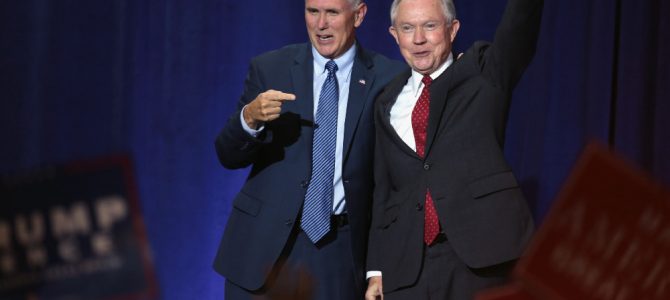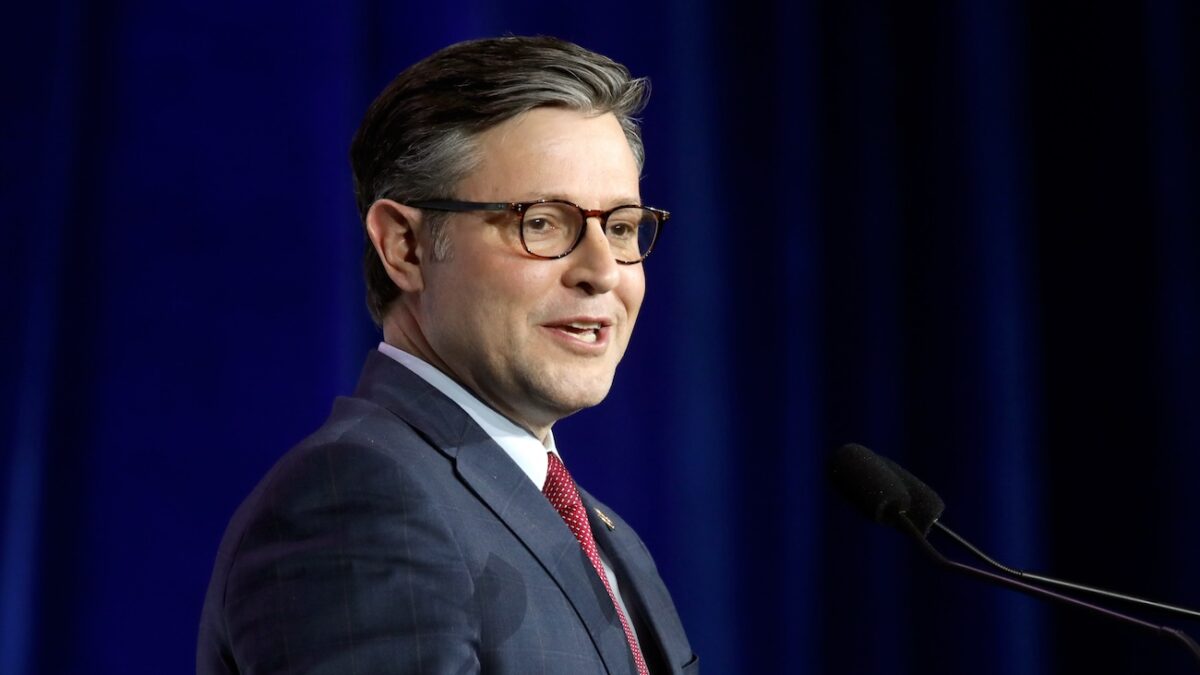
The drug problem in America, especially with regard to opiates, has been growing in the public consciousness. President Trump and Attorney General Jeff Sessions want to do something about it.
That’s an admirable idea, but increasing federal involvement in the drug war is not the way to go about it. The measures proposed last week are not those of a limited-government conservative, nor do they fit with the scheme of federalism designed by the Founding Fathers, which remains the best way to govern a sprawling and diverse nation.
The Last Drug War Was a Failure
Much of Trump’s appeal has been in how he seems to harken back to an earlier time in America, one that in his supporters’ minds was a better time. Nostalgia has its uses, and reminiscences will always be a part of people’s lives, but fond memories of the past do not always make a sound basis for government policy. In deciding what to do about crime and punishment, that is especially true.
Trump’s selection of Sessions for attorney general fits that old-time feel of the administration. Sessions was prosecuting criminals as a U.S. attorney in the 1980s, which was the golden age of the War on Drugs. As more and more dangerous narcotics flooded American communities in those days, the solution—which had widespread public support—was harsher and harsher punishments for dealers and users.
In the decades since, that consensus has started to shift. As we learned nearly a century ago during Prohibition, there is more than law enforcement to keeping addicts away from the substances they abuse. Certainly jailing drug traffickers will always play a role, but treatment and counseling are now widely seen, even among some conservatives, as an equally large part of the answer.
Sessions is not a part of that emerging consensus. As the Washington Post reported last week, “Sessions told his more than 5,000 assistant U.S. attorneys to charge defendants with the most serious crimes, carrying the toughest penalties.” This policy, the reversal of the Obama administration’s efforts to reduce the massive incarceration of nonviolent offenders, provoked a strong dissent on the Left and the libertarian Right.
In one way, he is right. No one can deny with a straight face that the increased sentences required by laws passed in the 1970s and ‘80s contributed to crime’s decline in the 1990s and 2000s. There were other factors at work—everyone has his pet theory—but keeping criminals away from the public undoubtedly reduced crime.
With that said, we must also admit that the kind of crime in question here, drug sales, has not declined in the least. Someone who wants to buy drugs in America can do so with little difficulty. Narcotics are cheap, plentiful, and available in a bewildering array of varieties. In that respect, the War on Drugs has been a complete failure.
More Crimes Means More Government
The divide on the drug war and on criminal justice reform generally runs along generational lines as much as partisan ones. Younger Republicans like Sen. Rand Paul see the bad effects of mass incarceration and the ineffectiveness in stopping the trade, and begin to consider rethinking the government’s approach to drugs, including legalizing some of the less harmful ones. Sessions, on the other hand, is more similar to those congressmen of days past who spelled marijuana with an H. Drugs, to them, are alien substances that only bad people use. For people of Sessions’s mindset, the only flaw in the war on drugs is that it has not been waged hard enough.
The divide is similar to that seen when the government tried to ban alcohol. After the Eighteenth Amendment and the Volstead Act passed, many prohibitionists predicted a profound, immediate decrease in alcohol consumption in America. The results proved otherwise. Instead of giving up or trying a different tactic, the government redoubled its efforts. They used wiretaps and surveillance, raided speakeasies with squads of heavily armed police, and generally dug deeper into the average American’s private life than ever before.
The big-government apparatus that grew around Prohibition soon adopted tactics even they would have blanched at when the amendment passed. By 1926, the Prohibition Bureau demanded that industrial alcohol supplies be increasingly poisoned with wood alcohol to prevent their diversion for use by bootleggers. As John Kobler wrote in his book, “Ardent Spirits: The Rise and Fall of Prohibition,” the result was not less drinking but more death. Wayne Wheeler, the head of the Anti-Saloon League, blamed the addict for his failures, saying that “the person who drinks this industrial alcohol is a deliberate suicide.”
Others saw the overreach in enforcement the same way many do today in the overreach of the drug war, and questioned why this crime was being treated so differently and excessively. “To meet the frailties of human nature by processes that do not prevail in the enforcement of any other law, save that of capital punishment,” wrote the New Haven Journal-Courier that same year, “is a perversion of sound government and public morals.”
But in seeking to regulate human behavior at such a personal level as dictating what we may and may not ingest, there is almost no alternative to Big Government. To control people’s lives so completely requires a massive use of money and manpower. Many people who said “there ought to be a law” when they saw a drunk passed out on the street began to realize that the solution could be worse than the disease. Sometimes a good look at the law makes one realize that there ought not be one, after all.
Small Government, Except When We Want It Big
This realization led to the repeal of Prohibition in 1933. As they did so, the federal government recognized that different communities ought to be allowed to manage the problem of alcohol abuse differently. The Twenty-First Amendment, which repealed the Eighteenth, allowed for that by returning alcohol policy to the states in cases that do not involve interstate commerce.
Some states instantly turned the taps back on; others remained alcohol-free zones (at least in law), with Mississippi in 1966 becoming the last to allow alcohol. Some counties and towns across the country still ban alcohol production or sales. The effect is a compromise that lets local communities decide the best laws to govern their people.
A version of this federalist policy in drug law is what Sessions and the Department of Justice hope to stymie with their new policy. It is a strange quirk of a party that usually calls for smaller, more locally based government. Republicans want to return abortion law to the states, health care to the states, and welfare policy to the states, but on drug policy they put forth arguments for federal jurisdiction that sound an awful lot like Democrats’ ideas. In one area they could create a bipartisan consensus on federalism, the Sessions wing of the party refuses to budge.
It is not a new problem. In the late 1990s, states’ medicinal marijuana laws tested the cooperation between states and the feds on drug policy. In 2004, these disagreements reached the Supreme Court in the case of Gonzales v. Raich, which they decided the following year.
Those advocating for local control sounded an awful lot like conservatives on other matters of federal overreach, as they questioned how the federal power to regulate interstate commerce could be construed to allow banning a product that was grown and consumed entirely within one state. Essentially: if a person grows marijuana in his backyard and smokes it on his back porch, where is the interstate commerce? How is it any of the federal government’s business?
The Supreme Court saw things differently, and Justices Antonin Scalia and Anthony Kennedy joined four liberals in upholding federal jurisdiction over the local production and use of drugs. Echoing the sort of decisions that have given constitutional conservatives fits for generations, Justice John Paul Stevens wrote for the court that a long line of caselaw has established that “Congress can regulate purely intrastate activity that is not itself ‘commercial,’ in that it is not produced for sale, if it concludes that failure to regulate that class of activity would undercut the regulation of the interstate market in that commodity.” That is to say: if the product is sold anywhere in America, anything to do with that product affects the market for it, and can be federally regulated.
It is hard to imagine anything not able to be regulated under this standard, and conservatives typically rebel at such a broad interpretation of what was originally intended to be a limited federal power. Abandoned by his usual allies on federalism issues, Justice Clarence Thomas took up the dissent. The respondents in that case, he wrote, “cultivate their cannabis entirely in the State of California—it never crosses state lines, much less as part of a commercial transaction. Certainly no evidence from the founding suggests that ‘commerce’ included the mere possession of a good or some purely personal activity that did not involve trade or exchange for value. In the early days of the Republic, it would have been unthinkable that Congress could prohibit the local cultivation, possession, and consumption of marijuana.”
Thomas’s originalism finds more favor now than even ten years ago, and hopefully the addition of strict constructionists like Neil Gorsuch to the Supreme Court will help turn the tide toward a rebirth of federalism. In the meantime, the Trump administration should try to remember which party elected them.
The problem of drug abuse, especially opiate abuse, is a real one, and every politician wants to be seen to do something about it. But their oaths of office do not pledge them to “do something”; they oblige them to support the Constitution. Besides being beyond their constitutional authority, much of the War on Drugs has been an ineffective failure. Instead of doing more of the same, Sessions and Trump should consider a new approach, one that favors treatment over punishment and local control over federal fiat.









